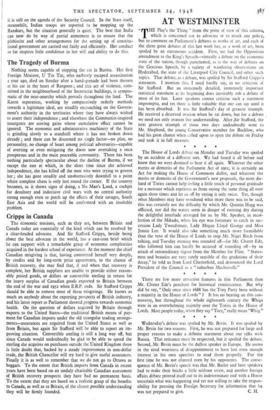AT WESTMINSTER
HE Play's the Thing" from the point of view of this column, which is concerned not to advocate or to attack any policy, but to comment on Parliament's debates as works of art, and each of the three great debates of this last week has, as a work of art, been spoiled by an extraneous accident. First, we had the Opposition amendment to the King's Speech—virtually a debate on the economic state of the nation, though punctuated, as is the way of debates on the Gracious Speech, by a variety of wandering observations on Hyderabad, the state of the Liverpool City Council, and other such topics. That debate, as a debate, was spoiled by Sir Stafford Cripps's statement. I mention this, I need hardly say, in no criticism of Sir Stafford. But an immensely detailed, immensely important statistical stateMent at its beginning does inevitably rob a debate of most of its fun. Later speakers cannot criticise such a statement impromptu, and yet there is little valuable that one can say until it has been absorbed. It was Sir Stafford's day of greatest triumph. He received a deserved ovation when he sat down, but for a debate we need not only ovation but understanding. After ,Sir Stafford, the next greatest triumph of those two days undoubtedly went to Mr. Shepherd, the young Conservative member for Bucklow, who had his great chance when called upon to open the debate on Friday and took it in full measure.
* * * * The House of Lords debate on Monday and Tuesday was spoiled
by an accident of a different sort. We had heard it all before and knew that we were destined to hear it all again. Whatever the other merits or demerits of the Parliament Act of 1911, it is certainly an Act for making the House of Commons duller, and whatever the merits or demerits of the Government's new proposals, the most die- hard of Tories cannot help feeling a little touch of personal gratitude for a measure which reprieves us from saying the same thing all over again three times and let us off by saying it only twice. Yet, though other Members may have wondered what more there was to be said, this was certainly not the difficulty by which Mr. Quintin Hogg was afflicted, nor did the waters seem in danger of running dry during the delightful interlude arranged for us by Mr. Speaker, in recol- lection of the Mikado, when his eye was fortunate to catch in suc- cession Lady Tweedsmuir, Lady Megan Lloyd George and Miss Jennie Lee. It would also take something much more formidable than the veto of the House of Lords to stop Mr. Nigel Birch from talking, and Tuesday evening was rounded off—for Mr. Chuter Ed; who followed him can hardly be accused of rounding off—by an attack of extraordinary vigour from the Member for Flint. "States-. men and beauties are very rarely sensible of the gradations of their decay," he told us from Lord Chesterfield, and denounced the Lord President of the Council as a "suburban Machiavelli."
There are few more attractive features in this Parliament than Mr. Chuter Ede's penchant for historical reminiscence. But why did he say, "Only once since 1688 has the Tory Party been without a majority in the House of Lords " ? It has no bearing on this con- troversy, but throughout the whole eighteenth century the Whip were in an overwhelming majority over the Tories in the House of Lords. Most people today, when they say "Tory," really mean "Whig."
* * * Wednesday's debate was spoiled by Mr. Sevin. It was spoiled by Mr. Bevin for two reasons. First, he was not prepared for large and proper reasons to make a definite statement about our talks with Russia. That reticence must be respected, but it spoiled the debate. Second, Mr. Bevin must be the dullest speaker in Europe. He seems in the tired weariness of disappointment to have lost even enough interest in his own speeches to read them properly. For the first time he was not cheered even by his opponents. The conse- quence of Mr. Bevin's speech was that Mr. Butler and later speakers had to make their bricks a little without straw, and another foreign affairs debate petered itself out to its indeterminate end with a House uncertain what was happening and yet not willing to take the respon- sibility for pressing the Foreign Secretary for information that he


































 Previous page
Previous page